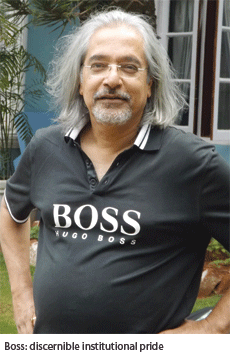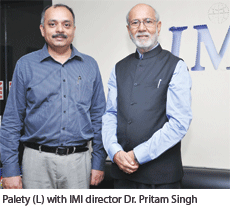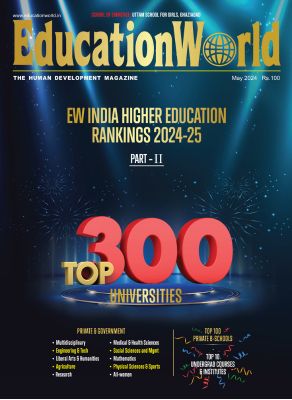Between them the Central government-owned IIMs admit only 2,880 of the 214,000 graduates who write the CAT (Common Admission Test) annually. EducationWorld commissioned the Delhi-based C fore to assess and rank India’s most respected non-IIM B-schools. Dilip Thakore reports
 Conterminously with the onset of the south-west monsoon and the commencement of the new academic year, 214,000 graduates of India’s 33,000 colleges and 659 universities as also a growing number of early and mid-career business executives who wrote the rigorous CAT (Common Admission Test, the joint entrance exam of the country’s 13 Indian Institutes of Management), AIMAT (All India Management Association Test) and specific admission exams administered by several business management education institutes this summer, are readying to enter one or the other of the country’s estimated 4,500 B-schools which have mushroomed countrywide. Having invested Rs.2-20 lakh per year by way of tuition fees, they carry high hopes and dreams in their minds and hearts as they enter the campuses of good, bad and ugly institutes of business education.
Conterminously with the onset of the south-west monsoon and the commencement of the new academic year, 214,000 graduates of India’s 33,000 colleges and 659 universities as also a growing number of early and mid-career business executives who wrote the rigorous CAT (Common Admission Test, the joint entrance exam of the country’s 13 Indian Institutes of Management), AIMAT (All India Management Association Test) and specific admission exams administered by several business management education institutes this summer, are readying to enter one or the other of the country’s estimated 4,500 B-schools which have mushroomed countrywide. Having invested Rs.2-20 lakh per year by way of tuition fees, they carry high hopes and dreams in their minds and hearts as they enter the campuses of good, bad and ugly institutes of business education.
Given the chance, the overwhelming majority of graduates who clear CAT and other B-school entrance exams would opt to join one of the country’s Central government-owned Indian Institutes of Management (IIMs), pref-erably one of the vintage ABC (Ahmed-abad, Bangalore, Calcutta) IIMs which over the past half century since they were established, have acquired global reputations for business management education. However, between them, the 13 IIMs admit only 2,880 students who top CAT annually, and of them six institutes are of very recent vintage and scarcely boast premises, let alone the sprawling green campuses of the premier seven IIMs.
The remaining 210,000-plus students are obliged to either go abroad (a relatively very expensive proposition) or pick and choose from among the other 4,500 B-schools countrywide — a risky proposition given that behind their glitzy facades and often paid-for media hype, a great majority of them are severely deficient in terms of competent faculty and contemporary curriculums, pedagogies and processes.
 “The huge reputation the IIMs enjoy is more because they attract the country’s best graduates, rather than the quality of faculty which is quite mediocre. I believe that the top 25 percent graduates of the best non-government B-schools are as good as the bottom 25 performers — in terms of grade points average — of the IIMs. They offer better value to companies inasmuch as they have more modest remuneration expectations and are more flexible about posting and assignments. Moreover there is a discernible growth of institutional pride in the best non-IIM B-schools which is in the national interest, because it spurs them to compete hard to close the quality gap between them and the IIMs,” says Manab Bose a former director of Colgate-Palmolive, GE and Tata Industries who supervised the HRD portfolio in these blue-chip corporates. Currently Bose, an alum of the Tavistock Clinic, UK, is the founder-director of the Bangalore-based Sukrut Human and Organisation Consultants Pvt. Ltd, which runs a busy psychotherapy clinic in this garbage — sorry, garden — city.
“The huge reputation the IIMs enjoy is more because they attract the country’s best graduates, rather than the quality of faculty which is quite mediocre. I believe that the top 25 percent graduates of the best non-government B-schools are as good as the bottom 25 performers — in terms of grade points average — of the IIMs. They offer better value to companies inasmuch as they have more modest remuneration expectations and are more flexible about posting and assignments. Moreover there is a discernible growth of institutional pride in the best non-IIM B-schools which is in the national interest, because it spurs them to compete hard to close the quality gap between them and the IIMs,” says Manab Bose a former director of Colgate-Palmolive, GE and Tata Industries who supervised the HRD portfolio in these blue-chip corporates. Currently Bose, an alum of the Tavistock Clinic, UK, is the founder-director of the Bangalore-based Sukrut Human and Organisation Consultants Pvt. Ltd, which runs a busy psychotherapy clinic in this garbage — sorry, garden — city.
Caution and discrimination in choo-sing a B-school is necessary because a large number of institutes are outright frauds under-invested in terms of infrastructure, number and qualifications of faculty. Often promoted by crooked politicians and/or real estate tycoons proficient in bribing their way through government bureaucracies which are never short of disqualification excuses, an uncomfortably huge number of the country’s 4,500 B-schools dispense obsolete, industry-agnostic education through visiting faculty of dubious qualifications, after seducing students through attractive advertisements featu-ring tall and usually unverifiable claims to pay up-front tuition fees for worthless certification.
A classic case in point is the Delhi-based Indian Institute of Planning and Management (IIPM, estb. 1973) which has 18 campuses across the country. Exposed by almost every respectable business and economic publication in the country for making wild and exaggerated claims in full-page advertisements in the Times of India and associated publications, and television news channels (Bennett Coleman Ltd which owns ToI is a shareholder under its ethically quest-ionable ‘treaty partner’ advertising space-and-time-for equity programme), IIPM reportedly hosts 1,300 students paying tuition fees of Rs.3-4 lakh per year on its campuses nationwide.
Its website (www.iipm.edu) which proclaims that IIPM is winner of ‘Asia’s Best Business School Award’ (no details of awarder) is a masterpiece of strategic omissions and obfuscation. Though it claims an excellent faculty, apart from embarrassingly naïve homilies from Dr. Malay Chaudhuri, a former professor at IIM-Bangalore (“knowledge of national economic planning potentiality will encourage the owners of capital to demand collectively the raising of living standards of the people at the bottom”) and his pony-tailed media star son and director Arindam, the website doesn’t name any faculty member. That’s because it’s well known that most faculty comprises Chaudhuri family members and in-bred IIPM graduates. The star alumni detailed on the website are less than stellar and the high rankings given to the institute are by the down market Zee Business television and DNA newspaper.
According to a well-known former director of IIM-Bangalore, the modus operandi of IIPM is to “bamboozle ill-educated parents and students from newly-rich tier-2 and tier-3 towns with high-voltage advertising and sales promotion proclaiming impressive campuses and international faculty, put them through its mish-mash self-designed education programmes, certify them and throw them to the wolves”. “IIPM is not recognised by AICTE (All India Council for Technical Education) or UGC (University Grants Commission) whose subsidiary NAAC accredits all respectable colleges and universities countrywide. This institute is perpet-rating a blatant and continuous scam enabled by corruption, endemic in India, and the dysfunctional judicial system which is inaccessible to cheated students,” says this academic, who preferred to remain anonymous.
This type of blatant misrepresentation and cheating is ubiquitous in the more than 4,000 B-schools across the country. With a large number of them promoted by powerful politicians and/or businessmen whom govern-ments and police are reluctant to prosecute, and with torts litigation almost dead in the country’s obsolete and choked-to-the-gills legal system, due diligence and careful investigation of the reputation of shortlisted B-schools is mandatory for students interested in acquiring meaningful business management education and certification from B-schools other than the reliable but very-difficult-to-access IIMs.
Against this wild west caveat emptor backdrop which characterises business management education in chronically misgoverned India, EducationWorld commissioned the well-reputed Delhi-based market research and opinion polls agency Centre for Forecasting and Research Pvt. Ltd (C fore, estb. 2000), which inter alia conducts the much awaited annual EducationWorld India School Rankings, to assess and rank India’s Top 50 B-schools excluding the elite IIMs. To assess the relative stren-gths and merits of India’s Top 50 ‘other’ B-schools, C fore drew up a shortlist of the 500 non-IIM business management institutes countrywide. The shortlist was presented with a structured ques-tionnaire administered to 532 B-school faculty members and 518 final year business management students in a mix of these institutes.
Respondents were asked to perceptually rate the 500 shortlisted B-schools on a ten point scale against nine parameters viz, competence of faculty, faculty welfare and development, research orientation, pedagogic sys-tems and processes, industry inter-action, industry placement, infrastr-ucture and facilities, value for money and quality of alumni. The scores awarded by respondents under each parameter were multiplied by ten and totaled. Ratings given by faculty/students to their own institutes were invalidated and B-schools not known to at least 50 respondents were eliminated form the rankings.
B-schools awarded the highest aggregate scores by the carefully selected and informed respon-dents are included in the inau-gural EducationWorld league table of India’s most respected Top 50 non-IIM B-schools. Also included for the first time ever to aid the growing number of school/college-leavers who prefer to make careers in the neglected sectors of agriculture or social entrepreneurship, is a league table rating and ranking not-strictly business or ‘sectoral’ B-schools.
 “I am fairly satisfied that the 50 B-schools ranked in our league table are the country’s best, excluding the IIMs, and that the gap between them and the government-owned IIMs which subsidies apart, also had an early start advantage over them, is closing. The quality of business management education delivered by the IIMs has suffered in recent times because almost 50 percent of students are admitted on considerations other than merit, i.e under special quotas reserved for scheduled castes, tribes and OBCs. Considerations such as social justice and equity aside, this has diluted teaching-learning standards in the IIMs. Moreover, for political reasons the new IIMs have been sited far away from industry hubs restricting their interaction and interface with business. On the other hand, non-government privately-promoted B-schools suffer neither of these disadvantages, which is why the closing qualitative gap between the best ‘other’ B-schools and the IIMs. Although only half the B-schools in the EW-C fore league table are doing serious research, in my opinion the teaching in India’s Top 10 non-IIM business management schools is as good as of tier-2 B-schools in the US,” says Premchand Palety, promoter chief executive of C fore who has been writing on management education for over a decade for several reputed publications including Wall Street Journal, Mint and Outlook, and has personally visited over 350 B-schools in India and abroad.
“I am fairly satisfied that the 50 B-schools ranked in our league table are the country’s best, excluding the IIMs, and that the gap between them and the government-owned IIMs which subsidies apart, also had an early start advantage over them, is closing. The quality of business management education delivered by the IIMs has suffered in recent times because almost 50 percent of students are admitted on considerations other than merit, i.e under special quotas reserved for scheduled castes, tribes and OBCs. Considerations such as social justice and equity aside, this has diluted teaching-learning standards in the IIMs. Moreover, for political reasons the new IIMs have been sited far away from industry hubs restricting their interaction and interface with business. On the other hand, non-government privately-promoted B-schools suffer neither of these disadvantages, which is why the closing qualitative gap between the best ‘other’ B-schools and the IIMs. Although only half the B-schools in the EW-C fore league table are doing serious research, in my opinion the teaching in India’s Top 10 non-IIM business management schools is as good as of tier-2 B-schools in the US,” says Premchand Palety, promoter chief executive of C fore who has been writing on management education for over a decade for several reputed publications including Wall Street Journal, Mint and Outlook, and has personally visited over 350 B-schools in India and abroad.
Clearly the vast majority of business management students critically needed by the Indian economy — one of the world’s most difficult countries in which to do business (ranked #132 on the World Bank’s Ease of Doing Business index) — who don’t make the cut for IIM admission need not despair. The gap between the IIMs and the Top 50 ‘other’ B-schools is rapidly closing. Driven by a healthy spirit of competition and sentiments of institutional pride, India’s best non-IIM business management schools are continuously improving teaching-learning standards and intensifying research initiatives. As a result, some of them are on a par with the Top 3 IIMs. For instance in 2010 (though not latest) league table of the world’s top B-schools, the London-based Financial Times ranked ISB, Hyderabad #12 globally, above all IIMs.
Moreover, the Mumbai-based S.P. Jain Institute of Management and Research (SPJIMR) has established spiffy, world-class campuses in Dubai, Singapore and Sydney, offering students the advantage of transnational business management education. And although there are not a few institutes of dubious reputation and antecedents among the country’s estimated 4,500 B-schools, it’s almost certain the evolution and upgradation of the Top 50 included in the inaugural EW-C fore league tables will inspire the next 50 best to raise teaching-learning and research standards. That’s what institutional pride — a welcome phenomenon — is all about.
To see India’s Top 50 non-IIM B-schools league table visit http://www.educationworld.in/rank-b_school/2013.html


























